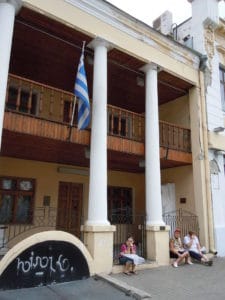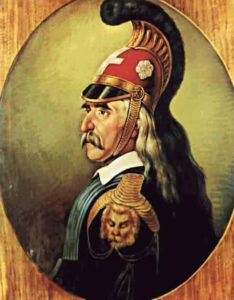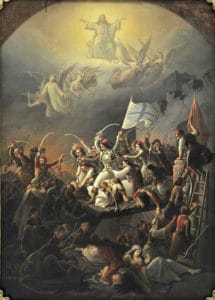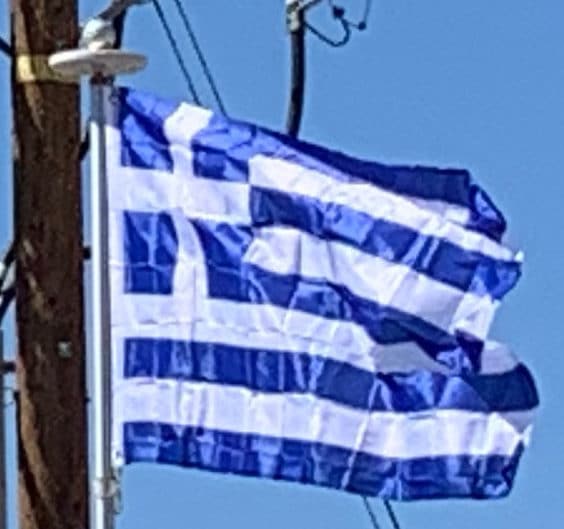
Appropriating a long-standing tradition of Orthodox messianic prophecy aspiring to the resurrection of the eastern Roman empire and creating the impression they had the backing of Tsarist Russia, they managed amidst a crisis of Ottoman trade, from 1815 onwards, to engage traditional strata of the Greek Orthodox world in their liberal nationalist cause. The Filiki Eteria planned to launch revolution in the Peloponnese, the Danubian Principalities and Constantinople. The first of these revolts began on 6 March 1821 in the Danubian Principalities under the leadership of Alexandros Ypsilantis, but it was soon put down by the Ottomans. The events in the north spurred the Greeks of the Peloponnese into action and on 17 March 1821 the Maniots declared war on the Ottomans.
By the end of the month, the Peloponnese was in open revolt against the Ottomans and by October 1821 the Greeks under Theodoros Kolokotronis had captured Tripolitsa. The Peloponnesian revolt was quickly followed by revolts in Crete, Macedonia and Central Greece, which would soon be suppressed. Meanwhile, the makeshift Greek navy was achieving success against the Ottoman navy in the Aegean Sea and prevented Ottoman reinforcements from arriving by sea. In 1822 and 1824 the Turks and Egyptians ravaged the islands, including Chios and Psara, committing wholesale massacres of the population. Approximately three-quarters of the Chios’ Greek population of 120,000 were killed, enslaved or died of disease. This had the effect of galvanizing public opinion in western Europe in favor of the Greek rebels.

Tensions soon developed among different Greek factions, leading to two consecutive civil wars. Meanwhile, the Ottoman Sultan negotiated with Mehmet Ali of Egypt, who agreed to send his son Ibrahim Pasha to Greece with an army to suppress the revolt in return for territorial gain. Ibrahim landed in the Peloponnese in February 1825 and had immediate success: by the end of 1825, most of the Peloponnese was under Egyptian control, and the city of Missolonghi—put under siege by the Turks since April 1825—fell in April 1826. Although Ibrahim was defeated in Mani, he had succeeded in suppressing most of the revolt in the Peloponnese and Athens had been retaken.

After years of negotiation, three great powers, France, Russian Empire, and the United Kingdom, decided to intervene in the conflict and each nation sent a navy to Greece. Following news that combined Ottoman–Egyptian fleets were going to attack the Greek island of Hydra, the allied fleet intercepted the Ottoman–Egyptian fleet at Navarino. A week-long standoff ended with the Battle of Navarino which resulted in the destruction of the Ottoman–Egyptian fleet. A French expeditionary force was dispatched to supervise the evacuation of the Egyptian army from the Peloponnese, while the Greeks proceeded to the captured part of Central Greece by 1828. As a result of years of negotiation, the nascent Greek state was finally recognized under the London Protocol in 1830.
Kingdom of Greece:
In 1827, Ioannis Kapodistrias, from Corfu, was chosen by the Third National Assembly at Troezen as the first governor of the First Hellenic Republic. Kapodistrias established a series of state, economic and military institutions. Soon tensions appeared between him and local interests. Following his assassination in 1831 and the subsequent London conference a year later, the Great Powers of Britain, France and Russia installed Bavarian Prince Otto von Wittelsbach as monarch.
